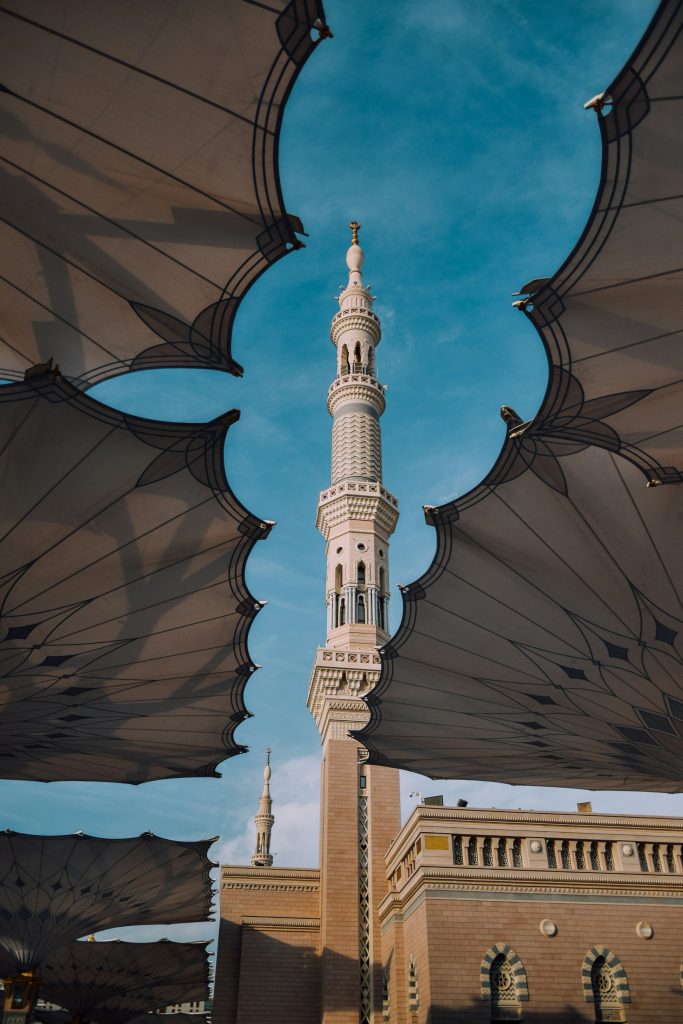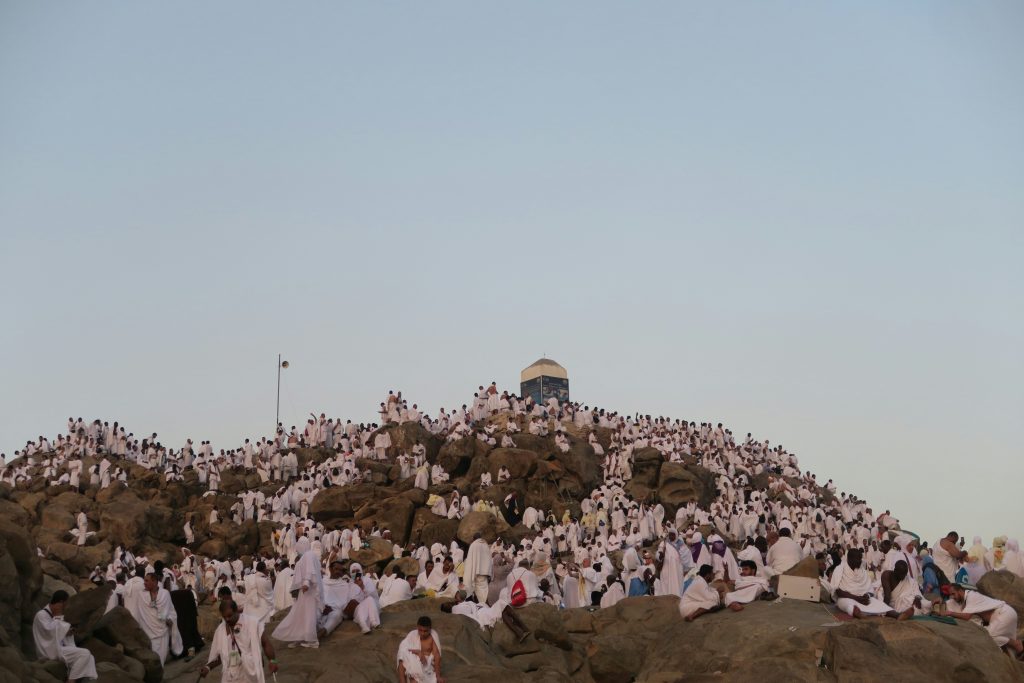#Islam
Experiences, Lessons, And Reality Checks From Hajj 2024
Published

Alḥamdulillāh, through the grace and mercy of Allah ﷻ, four of our IOK (Institute of Knowledge) team members were blessed with the opportunity to serve the ḥujjāj this year: Shaykhs Nomaan Baig, Ahmed Billoo, Zaid Khan, and myself. May Allah ﷻ accept our Ḥajj and allow us to continue to serve the ḥujjāj for several years to come.
Ḥajj is amazing. It is one of the most powerful, profound, awe-inspiring, humbling, and beautiful acts of worship in Islam. Millions of Muslims from every single corner of the globe of different backgrounds, races, colors, and languages, old and young, rich and poor gather together in the same place for the same purpose. They all gather to express their love, devotion, obedience, and submission to Allah ﷻ. It is the most amazing display of worship and unity seen in the world. No other religion, no other way of life can claim to have something similar to Hajj.
Out of all of the different acts of worship in Islam, Hajj is perhaps the most unique as well as the most difficult. What makes the Hajj so unique is that it is the only act of worship Muslims are required to do once in their lifetime. All of the other acts of worship we perform have some level of frequency to them. We pray 5 times a day, we fast the month of Ramaḍān every year, and we pay zakāh once a year. We are required to perform Ḥajj just once. It is a once-in-a-lifetime obligation that is supposed to lead to a lifetime of change.
Keep supporting MuslimMatters for the sake of Allah
Alhamdulillah, we're at over 850 supporters. Help us get to 900 supporters this month. All it takes is a small gift from a reader like you to keep us going, for just $2 / month.
The Prophet (SAW) has taught us the best of deeds are those that done consistently, even if they are small. Click here to support MuslimMatters with a monthly donation of $2 per month. Set it and collect blessings from Allah (swt) for the khayr you're supporting without thinking about it.
Ḥajj is an opportunity for us to reconnect with our Lord and Creator to change our lives; to start all over. A person who performs Hajj correctly has all of their previous sins forgiven. The Prophet ﷺ said, “Whoever performs Hajj for the sake of Allah and is not obscene and does not sin will return like the day his mother gave birth to him.” In addition to that the reward for an accepted Hajj is Paradise. As the Prophet ﷺ said, “There is no reward for an accepted ḥajj except for Paradise.”
A Beautiful Beginning
Our Ḥajj journey this year started in the beautiful city of the Prophet ﷺ al-Madīnah al-Munawwarah. The Illuminated City, which is illuminated by the presence, teachings, advice, counsel, and guidance of the Prophet ﷺ. Words can’t capture or describe the beauty of Madinah. The city has a certain feeling – a certain aura – of peace, tranquility, and contentment. It is a feeling experienced by everyone who goes there.
Some scholars divide the Divine Names and Attributes of Allah ﷻ into two categories: those of Jamāl – beauty – and those of Jalāl – power and strength. You experience the Jamāl of Allah ﷻ in Madinah and His Jalāl in Makkah.
We got the chance to perform our prayers in al-Masjid al-Nabawiyy, pray in the Rawḍah, directly convey our greetings to the Prophet ﷺ and his two Companions, Abū Bakr 

We took the train on Thursday evening, the 7th of Dhūl Ḥijjah, to Makkah to perform ʿUmrah. By the time we arrived at our Hotel, it was well past 11 pm. We then had the task of checking in more than 200 people, which was not easy. We met in the lobby at 1:30 am as a group and made our way to the Sacred Mosque to perform ʿUmrah. The crowd was relatively light and just as we finished the last leg of Saʿy we heard the adhān of Fajr.
We didn’t have much time between completing our ʿUmrah and starting the rites and rituals of Ḥajj. The rites and rituals of Ḥajj are performed on the 8th-13th of Dhūl Ḥijjah.
The Sunnah of the Prophet ﷺ is to go to Mina after Fajr on the morning of the 8th. Because of how our trip was scheduled and other circumstances, our plan was to leave for Mina at 4 pm. We ended up leaving after Maghrib because of natural traffic and delays due to Ḥajj. We settled into our Mina tent, prayed ʿIshā, had a short reminder about the significance of ʿArafah and duʿā, and then went to sleep.
“Hajj is Arafah”
The Day of ʿArafah is the most blessed day of the entire year. This is the day Allah ﷻ frees the most people from the Fire, boasts about His servants to His Angels, and accepts people’s supplications. This is the day that Allah ﷻ completed the Dīn and showered His unique favors and blessings upon His Prophet and Messenger ﷺ. Fasting on this day serves as a means of expiating two years of sin. The Prophet ﷺ said, “Ḥajj is ʿArafah.” The most important right and ritual of Ḥajj is being present in the plain of ʿArafah and supplicating to Allah ﷻ. We woke up about an hour before Fajr to get ready for prayer. The most valuable real estate on Ḥajj is in Mina; space is limited, and access to restrooms is challenging. There are very long lines, and it can take up to an hour to get a turn. We prayed Fajr in congregation in our tent, I gave a short reminder about duʿā in general and dʿuā on this day.
We left Mina around 5:50 am in a fairly chaotic manner. I like to call it organized chaos because everything still works out. We arrived in ʿArafah fairly quickly and settled into our tent. It is a large tent with approximately 300-400 people in it. Everyone gets a small futon, so space is very limited. The tent has A/C but at 11:30 am it was already 108° outside. At some point, it becomes ineffective. All of this is part of the experience of Ḥajj. It breaks the ego.
The ʿArafah experience was beautiful, calming, and cleansing. We had three sermons in the tent: Arabic, English, and Bosnian. We then prayed Dhuhr and ʿAṣr shortening and combining according to the practice of the Prophet ﷺ. After completing the prayer, we spent our time engaged in duʿā, dhikr, reciting Quran, and worship. We had from approximately 1 pm-7 pm to do so. As the sun set there was a feeling of peace, tranquility, and mercy.
Oppressive Heat: A Reality Check
Because of the bus schedule, we left ʿArafah for Muzdalifah around 9 pm. We arrived in Muzdalifah at a camp that was already full of people. We had to find an open space and claim it. Muzdalifah is an experience. There are very limited facilities; there’s a carpet on the hot earth beneath you, the sky above you, and you’re surrounded by countless people, buses, and noise. Despite all that, sleep at Muzdalifah is precious. We prayed Maghrib and Isha shortening and combining following in the footsteps of the Prophet ﷺ.
For most people, Muzdalifah is the most difficult part of Ḥajj. It is hard to describe the experience in words. It’s very hot, the ground is emitting heat, you’re sweating and tired, and there’s only enough space for you to lie down on the ground. There are bodies everywhere; next to your head, next to your feet, on the right and left, and people are walking over you. It is a very powerful lesson in humility. It doesn’t matter who you are, where you are from, how wealthy or powerful you are, you are sleeping on the floor with the rest of the Ummah. Many members said it reminded them of the descriptions of the Day of Judgment. Despite all that, I was able to get some sleep. We woke up about an hour before Fajr, prayed as soon as the time came in, and then did the wuqūf in Muzdalifah, which is one of the wājibāt of Ḥajj.
Departure from Muzdalifah was a challenge. There were thousands of people trying to get on a limited number of buses that would take them back to Mina. Our group split up; some were able to get on a bus and the rest of us decided to walk back to our camps. The walk back to Mina was about 40 minutes, which isn’t too bad.
Because of the extreme heat and fear of heat stroke and dehydration, I decided to take the group to stone Jamarah al-ʿAqabah at 11 pm. The time for stoning starts after Fajr, is best to do before zawāl, and according to the Aḥnāf, permissible until Fajr. Part of formulating fiqh decisions is giving consideration to one’s circumstances and potential harms. Alḥamdulillah, it turned out to be a great decision. The entire process of going to the Jamarāt, stoning, and returning to the camp in Mina was two hours and 15 minutes, 5.6 miles. We then hopped on a public shuttle to the Ḥaram. It took us to a bus stop right under the clock tower, where our hotel is. I found a barber and finally shaved my head to exit my iḥrām for Ḥajj. As soon as the barber finished, I heard the adhān for Fajr. I got the opportunity to pray behind one of my favorite reciters, Sh Baleela.
I went to my room, freshened up, and headed out with Sh Nomaan for ṭawāf al-ifāḍah and saʿy. The maṭāf was absolutely full so they pushed us to the roof. Ṭawāf on the roof is long, a total of 2.5 miles. That’s 8.1 miles so far. We finished in about an hour. We then completed saʿy in another hour, which is a total of 2 miles. That’s more than 10 miles.
We went back to the hotel and just crashed. We headed back to Mina on a bus that dropped us 20 minutes away from the Jamarāt. We stoned right before Maghrib time and walked another 2.8 miles back to our Mina camp. That’s more than 12 miles in one day!
Because of our scheduled return to Makkah and other circumstances, on the 12th of Dhūl Ḥijjah we decided to stone after Fajr. Because the bus to collect luggage showed up a little later than scheduled (it’s Hajj!) we started moving toward the Jamarāt around 9:30. At 9:30 it was already 100° plus. It is hot! We walked the 2.8 miles in the intense heat, stoned all three Jamarāt, and boarded our bus for the hotel around 11:15 am. I ended up performing the Farewell Ṭawāf around 1 am in a packed maṭāf.
May Allah ﷻ bless every single step we took, reward us for every drop of sweat, and protect us from ever experiencing the heat of the Fire. If the heat here is so intense, it is unimaginable how hot the fire of Hell will be. May Allah ﷻ protect us and remind us of that whenever we think about sinning or disobeying Allah ﷻ. May we remember that when the nafs and the whispers of Satan are trying to overcome us.
I want to highlight three unique lessons from this year’s Ḥajj:
- Unity – One of the most profound lessons experienced during Ḥajj is the potential for unity within our Ummah. Standing shoulder to shoulder with millions of pilgrims and circling the Kaʿbah with them, dressed in the simple, unifying white garments of iḥrām, I witnessed a powerful demonstration of equality and brotherhood. Regardless of nationality, ethnicity, or social status, every pilgrim is there for the same purpose: to worship Allah ﷻ. This unity transcends all worldly divisions and reminds us of the strength and beauty found in our collective faith. The experience reinforced the importance of solidarity and reminded me that we are all part of a global ummah, bound together by our shared beliefs and devotion.
- Sacrifice – Ḥajj is a journey of sacrifice; financial, physical, and emotional. People spend thousands of dollars and travel thousands of miles sacrificing comfort and convenience for a higher spiritual purpose. In Mina, you are staying in a tent with at least 50 other people with only an inch between you. You are sleeping on a simple futon, which I can’t fit on. You are sharing restrooms with a thousand other people, waiting in line for an hour or so. The sacrifice of comfort and convenience during Ḥajj is a reflection of the sacrifices we must make in our daily lives to stay true to our faith. This pilgrimage taught me that true devotion often requires enduring hardship and making personal sacrifices, all for the sake of gaining Allah’s
] Pleasure and drawing closer to Him
.
- Humility – The experience of Ḥajj destroys the ego. It is a very humbling experience. It doesn’t matter who we are, where we are from, how much money we have, or how important we think we are. None of this matters when we are in Mina, walking to the Jamarāt, standing before Allah ﷻ on ʿArafah begging for His Mercy and Forgiveness, and sleeping on the hot ground under the sky in Muzdalifah. As Americans, a lot of us are used to a life of convenience. I myself would go out of my way for personal convenience. During Ḥajj that doesn’t exist. There is no preferential treatment. I have to stand in line to use the washroom like everyone else. I have to sleep on the hot ground next to 1000’s of people in Muzdalifah just like everyone else.
A sign of an accepted Ḥajj is that a person’s life after Ḥajj is different than their life before Ḥajj. That the experience of Ḥajj truly changed the person inside and out. May Allah ﷻ grant us an accepted Ḥajj and answer all the supplications we made throughout the Journey.
Related:
Keep supporting MuslimMatters for the sake of Allah
Alhamdulillah, we're at over 850 supporters. Help us get to 900 supporters this month. All it takes is a small gift from a reader like you to keep us going, for just $2 / month.
The Prophet (SAW) has taught us the best of deeds are those that done consistently, even if they are small. Click here to support MuslimMatters with a monthly donation of $2 per month. Set it and collect blessings from Allah (swt) for the khayr you're supporting without thinking about it.
Shaykh Furhan Zubairi was born in 1983 in Indianapolis, Indiana. Shortly thereafter, he moved and spent most of his youth in Southern California, graduating from high school in Irvine in 2001. He began his pursuit of Islamic knowledge and spirituality at the Institute of Knowledge (IOK) in 1998, where he started the memorization of the Qur’an and studied the primary books in the Islamic Sciences and Arabic language. After starting college, he took a break and went to Karachi, Pakistan, for 9 months to complete the memorization of the Qur’an at Jami’ah Binoria. He returned home and completed his B.S. in Biological Sciences from the University of California, Irvine in 2005. He then traveled to Egypt to further his studies of the Arabic language. Thereafter, his pursuit of Islamic knowledge led him back to Pakistan, where he completed a formal ‘Alamiyyah degree (Masters in Arabic and Islamic Studies) at the famous Jami’ah Dar Al-’Ulum in Karachi. He has obtained numerous ijazat (traditional licenses) in the six canonical books of hadith, as well as the Muwata of Imam Malik and Imam Muhammad, and has also received certification in the field of Islamic Finance. Shaykh Furhan Zubairi serves as the Dean of the Full-Time and Part-Time Seminary Programs at the Institute of Knowledge in Diamond Bar, CA. He also serves as IOK University Chaplain for students at UCI and Community Chaplain for the local and extended SoCal Community, and he regularly delivers sermons and lectures at various Islamic Centers and events in Southern California. Learn more about Institute of Knowledge at www.instituteofknowledge.com.

You may like

Far Away [Part 7] – Divine Wisdom

How to Make this Ramadan Epic | Shaykh Muhammad Alshareef

[Podcast] The Parts of Being an Imam They Don’t Warn You About | Sh Mohammad Elshinawy

Op-Ed: Bitterness Prolonged – A Short History Of The Somaliland Dispute

Far Away [Part 6] – Dragon Surveys His Domain

An Iqbalian Critique Of Muslim Politics Of Power: What Allamah Muhammad Iqbal’s Writings Teach Us About Political Change

Darul Qasim College Given License To Grant Master’s Degrees

Muslim Book Awards 2025: Finalists

The Muslim Book Awards 2025 Winners

Op-Ed: From Pakistan To Gaza – Why Senator Mushtaq Ahmad Khan Terrifies Power And Zionism

How to Make this Ramadan Epic | Shaykh Muhammad Alshareef

[Dhul Hijjah Series] Calling Upon the Divine: The Art of Du’a (Part 1)

IOK Ramadan 2025: Four Steps | Sh Zaid Khan

IOK Ramadan 2025: Do Your Best | Sh Zaid Khan

IOK Ramadan 2025: Giving Preference to Others | Sh Zaid Khan
MuslimMatters NewsLetter in Your Inbox
Sign up below to get started
Trending
-
#Islam1 month ago
Restoring Balance In An Individualized Society: The Islamic Perspective on Parent-Child Relationships
-
#Life1 month ago
Faith and Algorithms: From an Ethical Framework for Islamic AI to Practical Application
-
#Current Affairs1 month ago
Quebec Introduces Bill To Ban Prayer Rooms On College Campuses
-
#Current Affairs4 weeks ago
An Iqbalian Critique Of Muslim Politics Of Power: What Allamah Muhammad Iqbal’s Writings Teach Us About Political Change


 ] Pleasure and drawing closer to Him
] Pleasure and drawing closer to Him 





